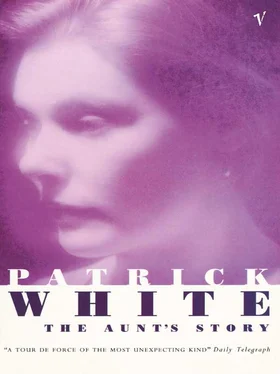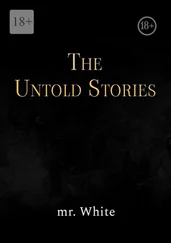‘Evenin’, Theodora,’ said Mr Parrott. ‘You’ll know everybody. Make yourself at home.’
This also made it easy for Mr Parrott. He dismissed himself, because for the life of him he never knew what to say to Goodman’s eldest girl.
Theodora walked about the rooms where the people that she knew laughed and prepared to loose their excitement in the dance. And now it began to stir her too, but also an uneasiness. She stood upright and alone amongst the furniture that had been pushed back along the edges or into corners of the room, abandoning its normal functions. In one corner of one room there was a statue, holding her hands in a position of ugly and unnatural modesty, and this was all wrong. Theodora wondered where she could put her own hands, but she could not think. Wherever she put them, these too were ugly and unnatural.
But Mr Spurgeon the storekeeper, and the second fiddle from the livery stable, and the rather freckled Miss O’Rourke began to toss out music into the house. They played ‘The Quaker Girl’. And as the music swooped, it caught up the pink tulle and the white satin, and the coloured bundles rose and fell on the wave, shook and giggled with the little twiddles that Miss O’Rourke’s hands so cleverly made. But it was above all the sea on which Fanny Goodman sailed. Her words and her laughter were the spray that would whip the dancers into a consciousness of eternity. Fanny always said she could die, she could die in the arms of a waltz.
‘ Come let us go to the ball ,’ sang Mrs Dinwiddie, and she tapped with her fan.
She was the bank manager’s wife, and she had a fine contralto, and played the harmonium at church.
‘ Music and merriment call ,’ Mrs Dinwiddie sang.
She would break off, and sing, and break off, and look round.
‘ Gallant young lovers and laughing gels ,’ she sang.
Because Mrs Dinwiddie could have done things so much better and suspected that, all the evening, she would be asked to do nothing at all. So her contralto brooded in the trough left by the violins.
Mrs Parrott looked at Mrs Dinwiddie and almost dared to frown. It was not according to plan, singing by Mrs Dinwiddie. Mrs Parrott wet her lips and looked round. She looked at Theodora Goodman, who was standing there, not having a good time. I must find a man, said Mrs Parrott. For the evening, at least, men had become commodities for Mrs Parrott. But by the time she had found ten minutes’ worth of old Mr Trevelyan, which for the moment was the best commodity that Mrs Parrott could provide, she saw that Theodora had gone. There was only the pushed-back furniture.
Theodora had gone out on to the veranda. Quite suddenly she had felt that she would have to live all her life in one evening. And her life was endless. She pushed back her hair. Outside the house stars spread. It was less constrained. Men or animals watched from the outer darkness, then the dog that came forward, fawned, a young and angular collie, put out his paw. Giving the affection for which she was asked, it seemed very simple to give.
‘What are you doing out here, Theodora?’ Father asked.
Now she could smell his cigar.
‘And what are you?’ she said.
Though there was no need to ask, and she could feel that he firmly intended not to tell.
‘You should go back inside,’ Father said. ‘You look nice. As nice,’ he said, ‘as anyone.’
She laughed. Because there was no deception. But she went back, and some remembered tenderness made her bright, either a word in the darkness, or the touch of a dog’s paw. She was dark and upright in her bright striped dress, the red, the yellow, and the black. Her eyes burned the eyes.
Theodora danced with three young men who were brought to her: Sam Irving, who was from that district, a Charlie King from Singleton, and a Ben McKechnie from Victoria. They talked to her, or rather, she gave them things to say, and altogether it was not so bad as they expected. Theodora was not so bad. She sat with her proud-coloured dress spread out, and sometimes she laughed, out of her face that was dark and thin.
All of a sudden her life had become as elaborate as a figure in the lancers. But as quickly finished, as significant.
Then they were eating the trifles and the cakes. It seemed that all the young men had already arranged to eat their trifles and cakes in equally fragile company. Laughter broke on the tables like meringues.
‘Who is the tall girl, alone?’ squinted a short-sighted woman from Goulburn, a second cousin of Mrs Dinwiddie’s.
‘The long, dark, slommacky thing in the striped dress? That is Theodora Goodman.’
And Mrs Dinwiddie crumbled her meringue. Perhaps while the music recuperated they might ask her to play, but until then she was without charity.
It could not cut. Theodora ate her supper. The crueller things, she knew, were unspoken. She could not bear Mrs Dinwiddie any grudge. People were grouped in the arbitrary positions of statues. If they also spoke ugliness their words were equally arbitrary. But sometimes a silence or a presence seemed to emanate a will of its own, and this was what she resented. The militant will in an intake of breath. Then she could hate the cut of a nostril, the droop of an eyelid above an eye.
But none of this halted the inevitable.
‘They’ve got to eat,’ Frank said. ‘Where’s Charlie? He can play. Charlie could rock a shearers’ ball. Come on, Charlie, give us a tune while the music’s eating sandwiches.’
So Charlie King, who was a wizard on the keys, began to play smooth mad music, which Fanny Goodman caught in her skirt, the water falling through the outspread tulle, she had to, dancing by herself outside the sound of glasses, in the middle of the empty floor. Fanny Goodman flowed through the blue water, because, of course, by this time it was ‘The Blue Danube’ that Charlie King always played. His hands rippled like a pair of kid gloves. They had no bones. Pouring the suave water that Fanny’s tulle skirt caught.
‘ La la le-le lasa ,’ sang Fanny Goodman, tossing her head to the swans.
And by this time some of the men had come and stood on the edge. They were strong and important now with food and drink.
‘By Jove, Fanny,’ called Ben McKechnie, ‘I’ll join you.’
He swam out to her, after her. She floated away, but he swam and touched her laughter, the bright glistening of Fanny Goodman. She did not resist or swim against the current. It carried them, the two, held together by the music, their eyes staring intently into each other’s, but ready also at the first sign to navigate treacherous water.
‘And how about Theo?’ Frank said.
She thought that probably Frank had been drinking. His eye was a fiery china, and he bent forward a little as if he were about to touch some small precise object.
‘Shall we, Theo? What do you say? Eh?’ said Frank.
His words lumbered. But he was a blaze of fiery gold she had never seen, and Theodora was burnt.
She touched his arm, and they danced. She was close to his breathing, close to his fire, to the short fierce hairs on his close neck. And the music took them and flung them, the cool and relentless music that they entered, to lose control, that they did not question. Inside the dictatorial stream they were pressed into a dependence on each other that was important.
‘Theo!’ called Fanny. ‘Look at Theo!’
And well she might, because the proud striped skirt of Theodora streamed with fire. Her body bent to the music. Her face was thin with music, down to the bone. She was both released from her own body and imprisoned in the molten gold of Frank Parrott. So that Fanny and Ben McKechnie stopped, and the others that had come out of the supper room looked, and it was something strange and wonderful that they saw, also shameful, because they did not understand.
Читать дальше












